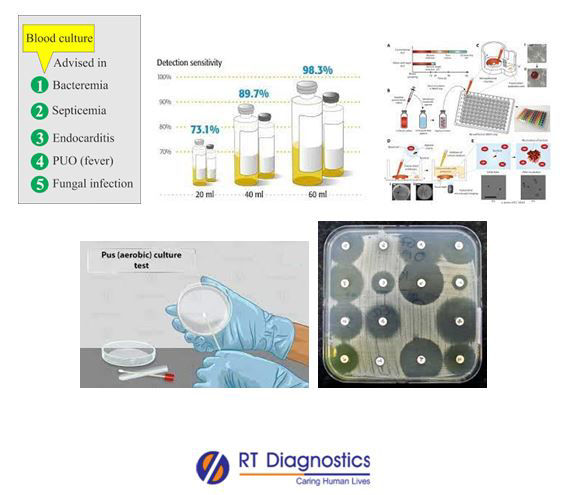Culture& Sensitivity – Blood- Aerobic:
Why Culture and Sensitivity (Blood-Aerobic) Test?
CLINICAL INFORMATION
The significance of blood culture test assists the physician to figure out the kind of infection present (which may typically originate from other specific sites within the body eg. UTI, infection from the urinary bladder or the kidneys, etc), in the bloodstream (also known as systemic infection) that can manifest and affect the entire body eg. endocarditis (inflammation and infection of the lining of the heart and/or heart valves, prosthetic joints, etc ). Therefore this test checks a sample of suspected blood specimen for the presence of any microbial organism that is causing an infection, leading to bacteremia, viremia, etc. Aerobic bacteria refer to the group of micro-organisms that grow in the presence of oxygen and thrive in an oxygenic environment. Aerobic bacteria can be classified into obliterate aerobes, facultative aerobes, microaerophiles, aerotolerant aerobes etc. Examples of aerobic bacterias are Nocardia sp., Pseudomonas aeruginosa, Mycobacterium tuberculi, E coli, Citrobacter, klebsiella, Proteus, Salmonella, Achromobacter, etc. Some risk factors that can increase the incidence of systemic infection include a weakened immune system due to an underlying disease such as leukemia, HIV/AIDS, etc, patients with immunosuppressive drug therapy, patients undergoing chemotherapy, patients with intravenous catheters, and/or surgical drains, etc. Complications of neglected chronic systemic infection include Disseminated intravascular coagulation (DIC), deep vein thrombosis (DVT), etc. while on the other hand, Anerobic bacteria refers to the group of micro-organisms that grows in the absence of oxygen and thus cannot survive in the presence of an oxygenic environment. Examples of anaerobic bacterias are Actinomyces, Bifidobacterium, Fusobacterium, Propionibacterium, Clostridium, Bacteroides, Prevotella, etc. Usually, this test is significant in cases such as UTI, tetanus, etc. Culture and Sensitivity (Blood – Aerobic) test helps to detect the presence of any systemic infection eg. septicemia that can lead to sepsis (a life-threatening complication). Clinical manifestations include chills, fever, fatigue, nausea, confusion, increased heart rate, nasal flare due to increased breathing -which may or may not be associated with shortness of breath on physical exertion, inflammation (presenting with cardinal signs of inflammation like – rubor, tumor, calor, dolor and loss of function), blood clots, drop in blood pressure, organ failure, elevated WBCs, etc. Other tests include CBC, gram stain, test for the presence of bacterial toxins (release of toxic by-products) eg staphylococcal infection eg. in case of foodborne-illness/food poison (or their toxins), different sample specimen collected for tests eg. blood, stool, urine culture, sputum test, CSF sampling, ascetic fluid, pleural fluid, pericardial fluid, synovial fluid, complement test (to check for increased levels of C3), etc and moreover sensitivity test (also known as susceptibility testing) are also performed in addition, for appropriate antibiotic treatment & for better prognosis eg. MRSA- methicillin-resistant Staphylococcus aureus, VMSA – vancomycin-resistant Staphylococcus aureus, etc.

General Instructions:
Sample Requirement: Specimen - Blood sample collected from the vein. Test Preparation: None.
NOTE - Sample for specimen collections may vary based on the patient’s condition/cases according to the patient’s presenting complaints/signs or symptoms:
SPECIMEN REQUIREMENT (Special or Rare Cases) - As instructed and guided by Physician / Clinician / Pathologist / as per Laboratory’s requirements, according to procedures and protocols.
Sample Requirement: Blood Sample taken from the vein
Test Preparation: None
This Multi-Specialty Clinical Referral Laboratory RT DIAGNOSTICS provides precise and accurate tests with an extensive range of testing services to the medical centers to help in the diagnosis and identification of pathology in the test specimens for infectious diseases and also to evaluate the function of organ systems of the patient. It prevents further complications and helps to stabilize and restore health to near normalcy at the earliest without delay.



